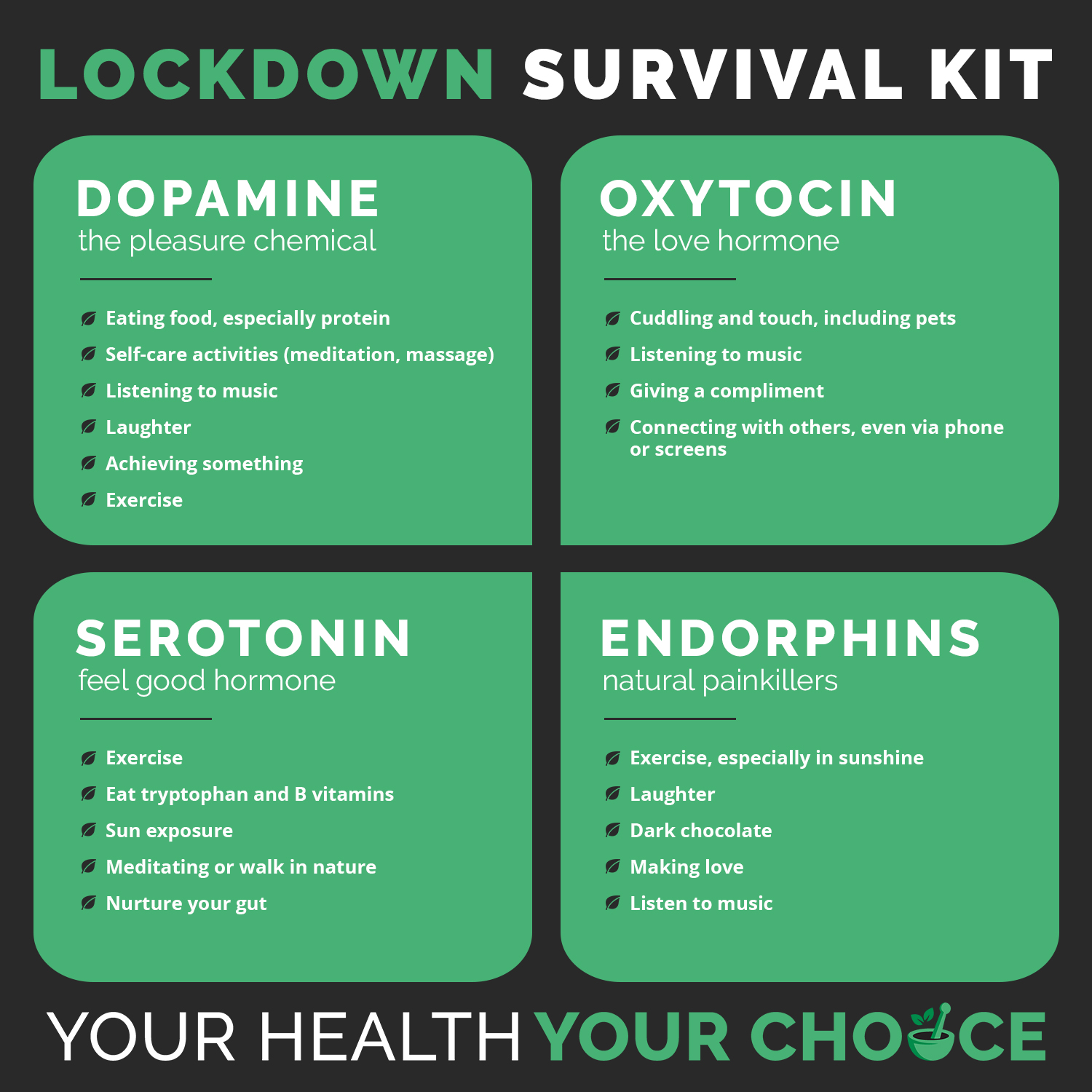Your Lockdown Survival Kit

With so many lockdowns happening frequently across our nation, caring for out mental health is a no brainer. Situations that make us feel safe, happy and connected tend to cause the release of several “feel good hormones,” including oxytocin, dopamine, endorphin and serotonin, all of which are dramatically challenged during extended lockdowns, closed borders and enforced isolation.
Let us take a look at simple ways to boost our mood hormones and help balance the negativity with positive action.
Dopamine – the pleasure hormone
Dopamine sends messages of pleasure to the brain when we are engaging in enjoyable activities and behaviour or anticipating a reward. It also gives you feelings of vitality.
Protein foods that contain the building blocks of amino acids, especially tyrosine, are essential to the production of dopamine. Researchers have found that a high protein breakfast both reduces cravings for sweet and savory foods, a key measure of dopamine production.
Movement is another crucial key. One three-month study has shown that participating in one hour of yoga or aerobics per week can significantly increase dopamine levels. Other studies suggest ten minutes of exercise a day substantially increases dopamine production.
Dopamine deficiency can play a crucial role in things like depression, addiction, fatigue, moodiness, lack of focus, insomnia, sugar cravings, low sex drive and inability to connect with others.
Oxytocin – the love hormone
Oxytocin, our “love” hormone, is increased when we hug and feel intimate with others. It contributes to our emotional wellbeing by encouraging social bonding and building relationships, also healthy reproduction, childbirth and breastfeeding. Oxytocin also reduces cortisol to help us feel calmer and better able to deal with stress.
Foods/supplements containing Vitamin D, Vitamin C, magnesium and dietary fats support the making of oxytocin. These include fatty fish, figs, melon, mushrooms, peppers, tomatoes, spinach, avocados etc.
Signs of oxytocin deficiency may include difficulty feeling affection, can’t enjoy social interactions, trouble keeping long-lasting relationships, lack of empathy, sex becomes mechanical, depression, anxiety, or fearful, etc. One interesting fact, due to its pro-social effects, too much oxytocin can bond us too strongly to our group which can fuel prejudice, envy, aggression and xenophobia.
The ultimate way to increase oxytocin is to hug it out, stroke a pet, doing something nice for someone else, or get a massage. Also, activities that relax you like meditating, or breathwork, to counter cortisol.
Serotonin – the feel good hormone
Serotonin plays countless important roles in our body and is intimately involved in enabling sustained and deep sleep, healthy mood, happiness and self-confidence, even a healthy appetite and social engagement.
Deficiency of serotonin means you’re more likely to become irritable, anxious, and perceive the world as unfriendly. You may feel depressed, pessimistic, and have irregular appetite and sleep.
The best way to increase levels is to exercise, especially out in the sunshine. Multiple studies have shown that exercise is at least equally effective at increasing available serotonin as serotonin-enhancing medications are, and in some cases, exercise is more effective.
Did you know around 70% of serotonin is produced in your gut, so a healthy gut is imperative – so eat a high fibre diet, avoid sugar, stay hydrated and perhaps take a good probiotic.
Tryptophan converts to serotonin. Tryptophan is found in chicken, eggs, cheese, turkey, beef, salmon and tuna, tempeh, beans, lentils, spinach and other dark green leafy vegetables, pineapple, pumpkin and chia seeds, and nuts.
Serotonin depends on Vitamin B6 to convert the tryptophan. Eat plenty of B6 foods such as cauliflower, bananas, avocado, grains, seeds, and nuts. Also, consuming B12 with folate increases levels of serotonin. Foods rich in B12 include cheese, fish, and meat while foods high in folate include green leafy vegetables, broccoli, cabbage, and whole grains.
Endorphins – the pain killer hormone
Endorphins are famed for being our natural painkillers. They are also released by the central nervous system and the pituitary gland during certain times of excitement, pain, stress or pleasure and produce a feeling of relief, well-being, joy, euphoria, and satisfaction.
Like the other mentioned hormones, the best way to increase endorphins is to exercise. Research suggests endorphin release occurs after 30 minutes of exercise. Other studies show an hour of moderate-intensity exercise increases endorphins. Moderate exercise means your heart rate and breathing speed up, but you may not be sweating too much.
Acupuncture, essential oils, yoga, and meditation have also shown to increase endorphins. Dark chocolate can also be added to your serotonin regime as it not only releases endorphins but has antidepressant actions as well.
Overall, keeping our mood up to help us rise above the current challenges we face during lockdowns and other restrictions is imperative. Ultimately, moving our bodies, eating well, mindfulness, and staying connected to others is the best way to get through these times.
Dopamine – the pleasure chemical
- Eating food, especially protein
- Self-care activities (meditation, massage)
- Listening to music
- Laughter
- Achieving something
- Exercise
Oxytocin – the love hormone
- Cuddling and touch, including pets
- Listening to music
- Giving a compliment
- Connecting with others, even via phone or screens
Serotonin – feel good hormone
- Exercise
- Eat tryptophan and B vitamins
- Sun exposure
- Meditating or walk in nature
- Nurture your gut
Endorphins – natural painkillers
- Exercise, especially in sunshine
- Laughter
- Dark chocolate
- Making love
- Listen to music
« Return to News & Features
